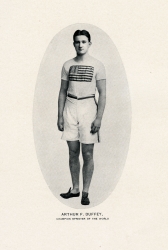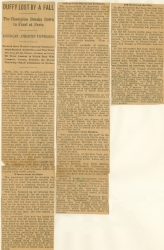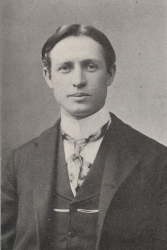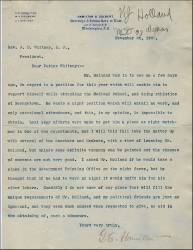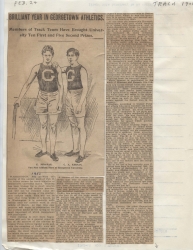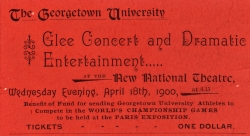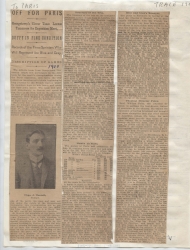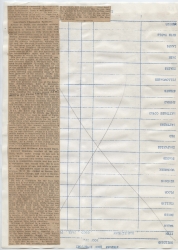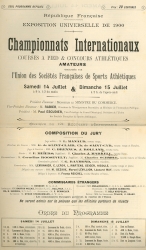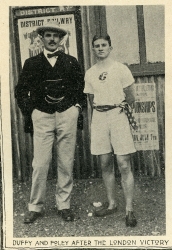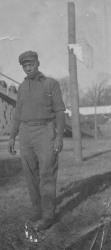The first Olympic Games of the modern era, held in Athens in 1896, appear to have gone relatively unnoticed on Georgetown's campus. Not so, the Paris Games of 1900. Three sprinters, Arthur Duffy, William “Billy” Holland, and Edmund Minihan, were selected to represent the University. Accompanying them were coach William Foley, team manager and Professor of French and Mathematics Charles Martell, trainer Theodore Woodward, and supporters Joe Richards, James Costello and William Byrnes. According to the Georgetown College Journal of December 1900, of the nine American Colleges represented at the Paris Games, only the University of Pennsylvania with a team of thirteen men placed in more events than Georgetown.
Arthur Francis Duffy (LL.B. 1903). Pictured in the 1904 Yearbook
Born in Boston, Duffy was one of the greatest athletes to attend Georgetown. At the time of the Paris Games, he held the world record for the 120 yards at 11 4/5 seconds and was the holder of all national records up to 135 yards. He became known throughout the country as the “world’s fastest man.” By far the favorite to win the Olympic 100 meters, he pulled a tendon and fell, while in the lead, during the final. He did not finish and was subsequently unable to compete in the 60 meter dash which he had also been expected to win. After retiring as a competitive runner, he joined the sports staff of The Boston Post.
“Duffy Lost by a Fall.” Results of the first day of competition in Paris, Saturday, July 14, 1900. Clipping from an unidentified newspaper
Duffy describes his collapse in the 100 meters final: “I do not know why my leg gave way. I felt a peculiar twitching after going twenty yards. I then seemed to lose control of it, and, suddenly, it gave out, throwing me on my face. But that is one of the fortunes of sport, and I cannot complain. I am glad the event went to an American.” The race was won by Horace F. Jarvis of Princeton.
The finals of the 100 meters had originally been scheduled for July 15th. However, many of the Americans had objected to racing on a Sunday. As a concession, the event was moved to the previous day. This change meant that the sprinters had to run three races (a heat, the semifinal and the finals) in one day, a circumstance which may have contributed to Duffy’s injury.
William Joseph “Billy” Holland (M.D. 1903). Pictured in a program from a Georgetown track meet, 1901
William Holland was regarded as one of the best 40 and 50 yard runners in the country, although his specialty was the 440 yards. He won the silver medal in the 400 meters in the Paris, placed second in the 100 meters handicap (a non-medal event), and finished fourth in the 200 meters. Following his Olympic success, he went on to become Intercollegiate Outdoor Champion in the quarter mile in 1901, with a time of 51 3/5 seconds, and in 1902, with a time of 49 3/5 seconds.
Letter from G. E Hamilton to University President John D. Whitney, S.J., concerning William’s Holland’s search for employment, November 22, 1900
Attention to both his medical studies and his athletic training, even post‑Olympics, clearly left Mr. Holland with little time for a job, hence his desire to find “a night position which will entail no work, and only occasional attendance.” Whether he found such a position or not, we do not know.
Edmund Joseph Minahan (enrolled in the Preparatory Department, 1899 1902). Pictured (left) in an unidentified newspaper with fellow Hoya athlete, C. A. Kernan, 1900
Only seventeen years old at the time of the Games, Edmund Minahan finished in a tie for third in the 60 meters dash but missed out on the bronze medal and won the 100 meters handicap race, a non-medal event. In the article which accompanies this picture, he is described as follows: “His strength and physical development are wonderful for his age. He stands 5 feet 11 inches, weighs 165 pounds, and is a perfect specimen of a well‑proportioned, muscular athlete. As a baseball and football player his capabilities are far above the average.” After leaving Georgetown, Minahan pitched for the New York Giants and the Cincinnati Reds
Benefit Concert Program and Ticket, April 18, 1900
Funding for the trip came mainly from subscriptions from alumni, students, and friends of Georgetown, and from the proceeds of a benefit concert staged by the Glee, Mandolin and Banjo Clubs. Concert goers paid 75 cents each for the privilege of hearing such toe‑tappers as “Whistling Rufus”and “The Sweetest Dream of All.”
Solicitation Letter from M. J. Colbert to John D. Whitney, S.J., May 5, 1900
As of May 5th, insufficient funds had been raised for the trip to Paris and a donation of $100 was requested from the University, to be repaid if “sufficient funds from other sources” were raised. The writer of this letter, M[icheal] J. Colbert (A.B. 1883, LL.B. 1885, LL.M. 1886) was chair of an alumni committee set up by Fr. Whitney to facilitate the Olympic trip.
“Off for Paris.” Clipping from an unidentified newspaper, June 1900
Passage was booked for the Georgetown contingent on the Dominion Liner New England, sailing out of Boston. Such a large delegation of alumni and friends turned up to see the nine off, that the Boston newspapers ran stories on the departure. Once the ship was underway, the team attracted considerable attention from the other passengers. Activities such as use of the promenade deck every morning at 7:30 for training – a special privilege granted by the steamship company – lead to speculation from some that they were a troop of traveling acrobats. After a voyage of eight days, the ship docked at Liverpool and the team traveled to London for the English Championships held on July 7th.
“The Blue and Gray in London and Paris.” Georgetown College Journal, November 1900
Arthur Duffy won the 100 yard race in the English Championships held on July 7th, despite being the smallest athlete in the field, and Billy Holland placed second in the 440 yards. The weather in England had been wet and chilly. Edmund Minahan caught a cold and did not perform up to expectations.
Championnats Internationaux. Official Program
This program was brought back from Paris by Arthur Duffy. Interestingly, it does not actually contain the word “Olympic.” The Games were greatly overshadowed by the World Exhibition, also held in Paris that summer. The French Government wrested control of the Games from Baron Pierre de Coubertin, founder of the modern Olympics and president of the International Olympic Committee, but took few steps to market them and put little effort into planning or organization.
Coach William Foley. Pictured with Arthur Duffy, 1900
Foley was perhaps the best‑known amateur track coach in the country at the time of the Paris Games. According to a program from a 1900 Georgetown track meet, he owed “ his success chiefly to the excellence of his methods and to his ability in seeing that his instructions are carried out to the letter by those under his charge.” Before coming to Georgetown in 1895, he had worked at Brown University.
Trainer Theodore “Thee” Woodward. Pictured in 1914
Mr. Woodward came to campus around 1895 and is probably the first African American to have been involved in Georgetown athletics. An account of the trip to Paris written by team manager Charles Martell, which appeared in the November 1900 issue of the Georgetown College Journal, noted that, on the steamship crossing, the captain had to grant special permission for Mr. Woodward to pass from steerage to the saloon staterooms.
Curated by Lynn Conway, University Archivist

